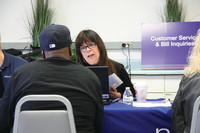“Our goal is to help our customers,” said a determined Gladys Sarji, National Grid Manager of Program Development and Governance, Wednesday afternoon at the Pilgrim Senior Center. Grid has teamed …
This item is available in full to subscribers.
We have recently launched a new and improved website. To continue reading, you will need to either log into your subscriber account, or purchase a new subscription.
If you are a current print subscriber, you can set up a free website account by clicking here.
Otherwise, click here to view your options for subscribing.
Please log in to continue |
|


“Our goal is to help our customers,” said a determined Gladys Sarji, National Grid Manager of Program Development and Governance, Wednesday afternoon at the Pilgrim Senior Center. Grid has teamed up with other agencies including United Way, The Energy Efficiency Program and the Supplemental Nutrition Assistance Program (SNAP) to help provide service to customers struggling to pay their monthly bills. Around 70 people made their way to the Pilgrim Senior Center Wednesday to discuss with different representatives their current struggles with their bills.
“To us, that is 70 families we are helping,” said Sarji.
Congressman Jim Langevin visited the program, saying he “commends National Grid for being proactive.” Langevin believes that Rhode Island has not fully recovered from the recession and that National Grid is being an extremely helpful resource to our people.
“It is all one roof we are trying to keep people under,” said Langevin.
Russell Wilcox sat in the front row of chairs clutching two bills as he waited for his number to be called.
“It’s kind of hard to run everything,” he said.
The bills for electric and gas total about $1,300, and Wilcox fears if a payment plan can’t be worked out the utilities will be shut off. That would not only impact him but the four tenants in his Apponaug apartment building.
Wilcox explained that he is dependent on his tenants paying their monthly rent of $750 in order for him to pay his mortgage, city utilities and the bills from National Grid. But one of the units has gone un-rented and he had to evict another for non-payment. He said his only other source of income is Social Security Disability Insurance of $700 a month.
If National Grid cuts service for non-payment, Wilcox said he’d lose what tenants he has remaining and “then I’ll be finished.”
Celina Allen of Cranston was there to get answers.
“My major concern is the rate increase for National Grid,” says Allen. She received a call from a National Grid employee recently and is trying to receive any help offered. When asked what efforts are being made in her home to lower costs, Allen said that she had sensors that shut off lights installed in her home in order to be efficient, “but even that is not helping.”
National Grid began to reach out to its customers last year and held a meeting at the Salvation Army in Providence, which received an “overwhelming” attendance, according to Media Relations Representative David Graves. Around 300 customers attended and were lined up at 8 o’clock that morning. National Grid’s focus is energy efficiency and educating its customers.
“The least expensive kilowatt is the one you do not use,” says Graves.
Grid employees reviewed outstanding balances with customers and helped set up payment plans.
Graves thought the moratorium on shutoffs for non-payment might be extended beyond the 15th of this month due to the unexpectedly cold spring weather.
Comments
No comments on this item Please log in to comment by clicking here